Jenny Fisher
THREE LEADING Labour voices have spoken out on social media to protest about an allegedly racist comment on Channel S. This may be the first time the three have been so closely united – but the story may yet become very divisive. Let’s try to unravel the positions that have been taken.
The comment
The furore arose because of a comment made by Mahee Jalil, founder of the Bengali language TV station Channel S, during a discussion on COVID-19 which was broadcast on Channel S live on 3rd May. A listener rang in and complained that Betel leaves (a key ingredient in Paan, a favourite delicacy in many Asian cultures) had been in short supply since the UK went into Lockdown – and the price of those on sale had gone up.
Betel leaves are sold in Tower Hamlets in many small shops which are owned by traders of Bangladeshi heritage. Was the price rise a sign that they were merely following the capitalist laws of pricing according to supply and demand, or were they profiteering?
At this point Mahee made a comment in Bengali – which is bound to lose in translation but can be summed up as being along the lines of “we have Hindu traits in our blood”. It was not clear who was meant by “we”. Protestors claimed Mahee said or implied “we Muslims”, and Mahee says he meant “we Bangladeshis”. Some videos of the comment are circulating on social media, but some appear to have been edited and do not give the full conversation with the caller.
A petition was then opened on the Change.org website (text below). It claimed that Mahee had said that Muslim shopkeepers were cheating their customers because they had inherited bad blood from Hindus – and it referred to this as an obnoxious racial attack on an ancient religion.
The petition itself did not ask for any particular action to be taken, though in its title it called for “extremely racist broadcasting by Channel S” to be “stopped”. The petition was discussed on social media, where people discussed whether a complaint should be made to Ofcom and/or legal action should be taken and/or whether Channel S should be closed down.
Mahee countered by apologising on air the following day, backing this up a day later by issuing a written statement of apology. He said that when he referred to “we” having Hindu traits in our blood, he meant people of Bangladeshi origin, not Muslims (and that he didn’t use the word “Muslim”, though the petition claimed he did). He also said that what he meant by “Hindu traits” being in “our blood” was that people of Bangladeshi origin traced their roots back to one state of India, a state dominated by those who followed the Hindu religion. Practices such as profiteering were common in that state, so the profiteering that was on show in the UK today could be traced back to the old culture and practices of the Hindu-dominated state.
Channel S also issued a written apology: on social media, some Hindu commentators indicated that these apologies should now suffice, and there was no need for a further campaign.
Was this a racist comment?
Given that the comment referred to a religion rather than a race, some people would say that it is not technically racist – though “Hinduism” is generally taken to have a cultural and ethnical meaning as well as a religious one. However, it certainly sounded like a religious-ist comment, or a comment denigrating a particular religion, to try to put it more elegantly. And this is not acceptable.
Mahee himself realised, after the broadcast, that he had said something which could have caused, and did cause, offence, and he quickly went on to apologise. He indicated that it was not his intention to offend Hindus. Nonetheless, the words he actually used, even if not spoken with the intention of offending Hindus, were offensive. The words should be withdrawn and the speaker should apologise – which they have been, and which he has done.
The response from Labour’s public representatives
The two Tower Hamlets MPs, Rushanara Ali (Bethnal Green & Bow) and Apsana Begum (Poplar & Limehouse), and the borough’s Executive Mayor John Biggs were quick to issue statements on social media about the comment. All three statements acknowledged that the writer had not heard the comments at the time they were made and said that the writer had “been informed” that offensive comments had been made. None of the three indicated whether the un-named informant had told them what the comment actually was or had just told them that the comments were offensive. None of the three indicated whether they had gone back and listened to the comments being made to judge for themselves. They don’t say, so we don’t know whether they did or didn’t. None of the three says whether they asked whether an apology had been made before posting their condemnations on their social media.
 Rushanara Ali MP implies that she may have reviewed the comments, as she refers to a video having been brought to her attention, rather than the comments were brought to her attention. She refers to Mahee having made “offensive and racist comments about the Hindu community”. She said that she was “deeply shocked by the hateful and reprehensible remarks made by Mr Jalil” and that he should “apologise immediately and retract the offensive, racist comments” [our emphasis]. She concluded by stating that she was proud to represent a diverse constituency, including those from the Hindu community.
Rushanara Ali MP implies that she may have reviewed the comments, as she refers to a video having been brought to her attention, rather than the comments were brought to her attention. She refers to Mahee having made “offensive and racist comments about the Hindu community”. She said that she was “deeply shocked by the hateful and reprehensible remarks made by Mr Jalil” and that he should “apologise immediately and retract the offensive, racist comments” [our emphasis]. She concluded by stating that she was proud to represent a diverse constituency, including those from the Hindu community.
 Apsana Begum MP is slightly more measured in that she pauses to comment on the diversity of East End communities and our positive record in fighting racism and fascism. However, she then uses words which are very similar to those used by Rushanara Ali: she is “deeply shocked to learn of the offensive and racist comments towards the Hindu community” [our emphasis]. Apsana does seem to have looked further into the whole story, in that she does not ask for Mahee to retract his comments but acknowledges that he already has.
Apsana Begum MP is slightly more measured in that she pauses to comment on the diversity of East End communities and our positive record in fighting racism and fascism. However, she then uses words which are very similar to those used by Rushanara Ali: she is “deeply shocked to learn of the offensive and racist comments towards the Hindu community” [our emphasis]. Apsana does seem to have looked further into the whole story, in that she does not ask for Mahee to retract his comments but acknowledges that he already has.
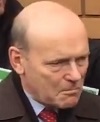 Executive Mayor John Biggs responds in different language in a statement he makes in his official, rather than his personal, capacity. He states that he has “become aware of a tv broadcast” and calls on the speaker to apologise (rather than acknowledging that he already has). He also “understands” that the broadcast will be raised with Ofcom: it seems that his informants are sharing their plans with him.
Executive Mayor John Biggs responds in different language in a statement he makes in his official, rather than his personal, capacity. He states that he has “become aware of a tv broadcast” and calls on the speaker to apologise (rather than acknowledging that he already has). He also “understands” that the broadcast will be raised with Ofcom: it seems that his informants are sharing their plans with him.
Let’s be clear: this is not to condemn any of these three politicians for speaking out. Racism – and, for that matter, sexism and other prejudices and practices such as domestic violence – should be called out and shamed in public. However, politicians should consider reflecting on what they are saying and calling for – and whether they are shedding more light or more heat on the problem.
Is their response proportionate?
None of the Labour representatives says anything along the lines of “I was so shocked to hear this that I contacted Mahee to tell him of my shock and to ask him to apologise.” They all refer to being shocked and they either call on Mahee, in their public statements, to apologise or, in Apsana’s case, acknowledge that he has done so. This does give the impression that what is more important for the three of them is making their views known to the public, rather than trying to use their position to secure any kind of resolution to the matter. If they are so shocked, why did the three of them not contact Mahee direct to urge him to apologise (or tell him he was right to do so) – which was what they say they wanted to happen? Would that not have shown a deeper desire to heal this matter, rather than rushing to make a condemnation on social media?
Apsana concludes her social media statement by saying that she stands “in solildarity with the Hindu community against racism, intolerance and division”. By finishing her statement this way, Apsana does imply that Mahee’s statement has caused “racism, intolerance and division”: is this really the case, or is she going too far?
While racism should be called out, it also needs to be stamped out – and sometimes echoing outrage while not looking at the circumstances can fan flames. Could none of our politicians have said something along the lines of “I heard there had been offence; I investigated; I condemned it; I welcomed the apology; I’ll do all I can to heal this division”? That kind of action, these words, could have been a condemnation which also sought to heal, rather than stoke fires.
This is intended as a frank but honest contribution to a debate about how we deal with racism in Tower Hamlets and the wider community. Such a debate would be very timely, given that just over a quarter of a century has passed since the first BNP Councillor in the UK lost his Millwall Council seat (receiving more votes when he lost his seat than when he had won it).
It is only fair to acknowledge that some in the community would wish our representatives to speak out more often.
•We cannot recall that Rushanara and John rushed to comment on the then MP Jim Fitzpatrick’s comments about “the worst kind of Bengali politics” (made before Apsana was elected) – but many local residents regarded those comments as racist and would have welcomed other politicians speaking out.
•More recently, Executive Mayor John Biggs has announced his intention to sack the Tower Hamlets Council workforce and re-engage them on new contracts. Town Hall trade unions have argued that this step and the new contracts affect lower paid workers – in other words, women and BAME workers – disproportionately badly. Again, we cannot recall local politicians siding with the unions and condemning the proposals as they were racist in effect.
•Those who worked in or used the Community Language Service were very vocal about their belief that shutting the actual service and delivering its work “differently” again disadvantaged the BAME community in Tower Hamlets. Many of the people affected by the cut would have welcomed statements from our public representatives saying that these actions were racist.
With all this ferment going on, we need to be very clear headed about calling out and combatting direct racism, but we also need to be thoughtful about how we correct words and deeds that are not intended to be racist but which have racist undertones or overtones. (If anyone does have contemporary public comments that they made, please let us know and we would be happy to correct this.)
To recap:
•Mahee’s comment was wrong and offensive. It caused offence and he was right to retract it and apologise. Channel S was right to apologise.
•Our MPs and the Executive Mayor were right to condemn the comment – but it may be that they should have commented on the apology as well as the comment itself, and that they should consider whether their words are helping to heal divisions in the community.
•Racism, and all the prejudices which contribute to inequality, is a complex business, and it will take hard work and understanding to eradicate it and forge the liberated society that most of us want to see. It is easier to condemn racism than it is to eradicate it.
•Note: everyone named in this article is welcome to comment below or to write a response for publication. Everyone not named in this article is also welcome to join the debate.
The text of the petition
The official apology from Channel S
 East London News A Force for the community…
East London News A Force for the community…
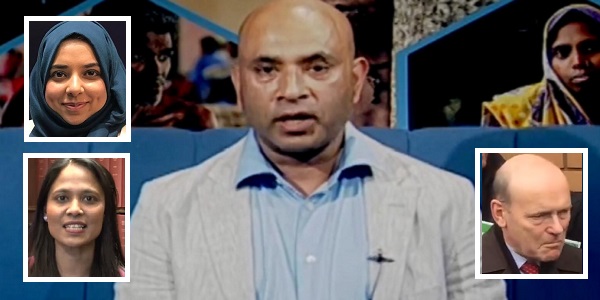
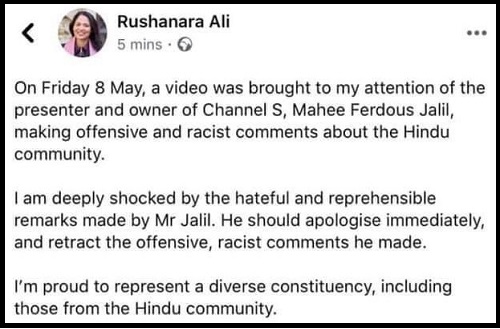
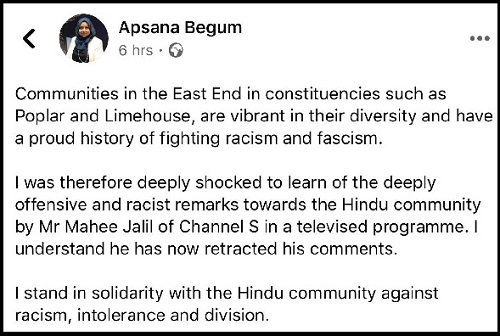
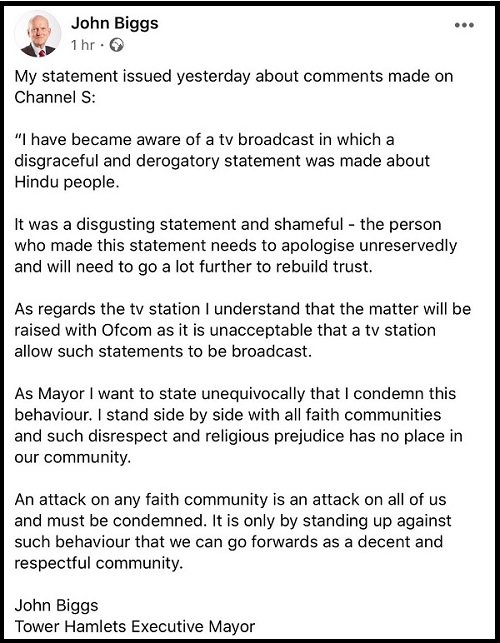
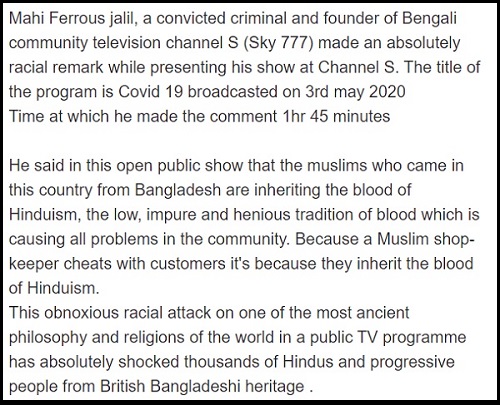
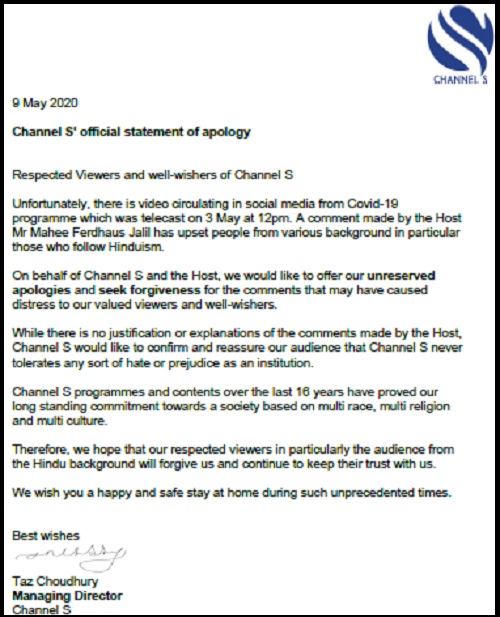

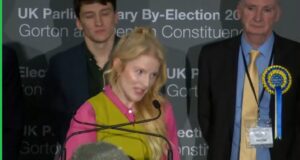
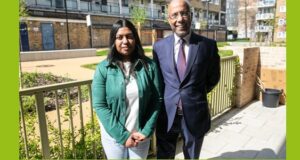
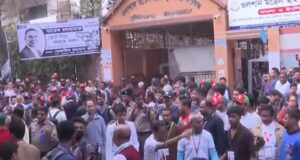
Your article is nonsense. The content is misrepresentation of what he actually said. You said the offensive content was not heard or seen by the MP’S or anyone commenting at the time, you also said that video may have been edited… The comment, video is available although Channel S has now taken it off air.
Secondly, you said Mahee and Channel S was quick to apologise again you have done your homework. The after on another similar programme Mahee defended his action and what he said, and shoved it aside that he didn’t care.
Your interpretation of what he said obviously didn’t come from source it seems hearsay so you have misrepresented that also. You obviously have not done any proper research to back up your content. This long article is totally a farce…
Thank you for taking the time to read this article and then comment.
Please note that the article agrees that the comments were racist (without repeating them).
It was the MPs who said, in their social media posts, that they had not heard Mahee’s comments first hand – and we didn’t mention whether anyone else who commented did so without looking at the original at all. We said that some of the videos circulating on social media were of less than the full conversation (which is true) and we did not say that the full conversation was not available.
I respect, but do not share, your opinion.
Maybe you should listen to his other apologies and a hand gesture he made on TV too. This man should NOT be on TV, full stop. His remarks were discriminating, offensive and enticing hatred among the community to encourage violence.
He’s remarks were racist, there is no doubt about that and then he changes his words in a apology to imply just a few castes. Still racist my friend. He is only looking at ways to get out of the issue. His words were from his heart. I don’t think he or anyone can deny this.
What are your thoughts?
Thank you for taking the time to read this article and to comment.
I agree that the comments were racist (as the article makes clear). You will see that the article does not defend him (and nor do I).
Who published this article, this is utter nonsense.
There is nothing edited, if your going to write an article use the correct terminology.
Edited means enhanced in some sorts, the word you are trying to refer to is the clips on social media seems to be a ‘snippet’ of the conversation which is true because the program was 2 hours long, the clip that was uploaded was the part of the program which he for no reason at all became racist against hindu’s.
Your comment – ‘Mahee countered by apologising on air the following day, backing this up a day later by issuing a written statement of apology. He said that when he referred to “we” having Hindu traits in our blood, he meant people of Bangladeshi origin, not Muslims (and that he didn’t use the word “Muslim”, though the petition claimed he did) <- this is also wrong as he did not apologise the following day infact days later he appeared on a charity show where he was presenting and a caller had called in to confront him and instead of apologising he shrugged it off and said ‘do what you got to do’)and was not at any point ready to say sorry and he did mean muslims had inherited the blood of what he called 'low caste hindu's'
It seems that all of a sudden then I think after speaking to some colleagues he saw people were getting angry as more and more people started calling him and confronting him and he saw the matter was escalating to which then he decided to apologies and that too was just read off a piece of paper.
There was a written apology also release later by the MD of Channel S which was an excuse of an apology starting with ‘Unfortunately, there is a video circulating in social media ….’ he seems to be more concerned that there is a video circulating around social media rather than the fact the racism is being preached by Mahee on the channel.
Please do not publish such nonsense in the future if you do not know the full story.
Thank you for taking the time to read our article and to give a full account of Mahee’s comments – which I had summed up as “denigrating religion, wrong and offensive”. Thank you also for taking the time to share your further views on the matter.
I am shocked to see in your article the misrepresentation of what Mahee had said in the programme that day.
I am a Hindu and from India. I have no business with Bangladeshi community irrespective of any religion.
But whatever Mahee has said brings me into this debate. When I was a child, I used to hear about genocide of Hindus in Bangladesh but I used to ignore those as being overblown.
However, when I migrated to this country, I found that some converted (from Hinduism to Islam) crooks in Bangladeshi community try to defame the Hindu community in general and particularly the Bangladeshi Hindu community, for their own reasons. I guess that comes from their vengeful attitude as their ancestors centuries ago, had converted from Hinduism or Buddhism for some reason or other. In early 1950s the percentage of Hindu population in Bangladesh, then East Pakistan was 38%. This has now drastically reduced to merely 10 %.
Now the issue is that the channel is broadcasting such programme not in Bangladesh but in UK. This country is considered to be one of the leading countries that champion multi-culture, multi faith, non-believers and multi linguistic pluralism in communities. People residing in India, Bangladesh or Pakistan follow UK closely. If people and Government in UK don’t take actions against this sort of hate speech or propaganda in a public forum like Mahee has done in the programme, then we are doing a very big mistake for future. The current government and people of India, unlike past 70 years, under PM Modi will not tolerate such hatred and repercussion will certainly follow here or somewhere, today or tomorrow and I am very sure that you must be aware of it.
Thanks
Thank you for taking the time to read our article and reply and I’m sorry you felt that it misrepresented what Mahee had said. I note your view on Bangladeshi people trying to defame Hindus because they are vengeful – though I believe that this statement is one which some of those Bangladeshi people could find offensive. The same applies to your statement that the people of India, possibly including PM Modi, will see that there are repercussions. I hope we can find a way to de-escalate the tension and conflict and find a way for Hindus, Muslims and the rest of humanity to move forward in peace.